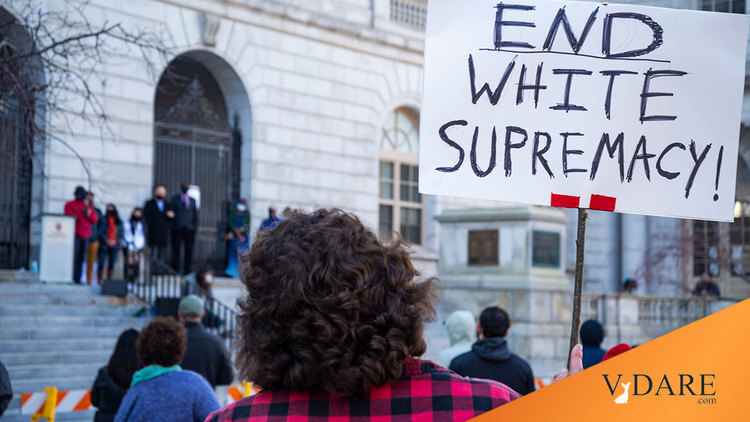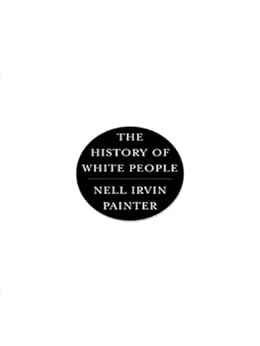


02/21/2014
Now here’s an interesting thing. Using the handy Google Ngram Viewer, which shows you how the frequency of words and phrases has changed over time in “lots of books” (the ones archived in Google Books), I see that racism is in decline!
The word, that is. After taking off around 1940 the word peaked in 1998. Then over the next ten years, which is as far as Ngram goes, occurrences of “racism” dropped off by 18 percent — nearly a fifth. Curious! [Click on any chart to be taken to the Ngram View.]
Not really that curious. Words and phrases with some social or emotional charge tend to lose that charge over time as people get used to them, like batteries running down. The charge then needs to be transferred to some newer term.
Accordingly, check out the Ngram for “white privilege.” Across those same ten years, 1998-2008, occurrences of “white privilege” show a remarkable 72 percent rise.

"white privilege"
Not all these things are clear-cut. I tried to go from the social phenomenon (racism) to the individual (racist) but got ambiguous results. Occurrences of “racist” sure enough dropped 18 percent across 1998-2008, the same as for “racism.”
I thought “white supremacist” would be the recharged version, but it followed a different track, rising to five percent above the 1998 baseline in 2004, then dropping to two percent below it in 2008.
The dwindling use of the words “racism” and “racist” anyway means a net increase in honesty…I think. Or at the very least, a net decrease in confusion. That’s because people who used “racism” and “racist” always had to wrestle with a dread possibility: that these words might be applied to nonwhites!

Dictionary definitions seemed to leave this possibility open. The common essence of those lexicographical rulings was captured by the black historian Nell Irvin Painter. Racism, she wrote, is:
the belief that races exist, and that some are better than others[The History of White People, Nell Irvin Painter (2011)]
The dogmatic assertion that races do not exist, is of course, what VDARE.com calls “race denial” and is essentially an assertion of faith over facts. But it does sounds like something anybody might succumb to. Or even everybody: “Racism affects and dwells within each and every one of us,” argued a prize essay from the Dartmouth College English Department, attributing the sentiment to novelist Toni Morrison. (I hope my old National Review colleague Jeff Hart, a Professor Emeritus at Dartmouth, wasn’t around for the judging.)
But people who actually used the words “racism” and “racist” in earnest mainly wanted to talk about white people being mean to nonwhites. So the fact that the dictionary definitions leak somewhat was a problem for them.
Indeed, some impudent whites, angry at being shut out of jobs or colleges because someone needed to fill a race quota, even used the term “reverse racism” to describe the motive behind their exclusion. Professional anti-racists regard this term as highly pernicious. Longtime “antiracist trainer” Tema Okun in her 2010 book The Emperor Has No Clothes: Teaching About Race and Racism to People Who Don’t Want to Know, gives over two full pages (55-57) to debunking it. (The author’s name, I can’t resist noticing, is an anagram of “Me, a nut? OK.”)
One popular solution to the problem of leaky definitions: to smother the discussion of racism in a mass of distracting verbiage, like the reflective chaff that planes and ships put out to confuse homing missiles. Thus the definition of “racism” offered by Tim Wise [Email him] runs to nearly 1,200 words.
Another strategy, available to commenters with some credentialed standing, has been just to declare ex cathedra that only white people can be racist. Here is Michael Eric Dyson, a black Professor of Sociology at Georgetown University: “Can we be bigoted? Yes. Can we be prejudiced? Yes. Racist? No.” [Michael Eric Dyson Shares Why ‘Black People Can’t Be Racist’, BET, October 4th, 2012.]
Other well-credentialed commentators have pushed the idea further. For example Dr. Shakti Butler, who describes herself as “an African-American woman of biracial West Indian and Russian-Jewish heritage” and makes a living writing and talking about this stuff, is on record as teaching that “the term [racist] applies to all white people,” but to no “people of color” at all.
“Racist” is just a synonym for “white,” then, according to this expert.
Retired college history professor Noel Ignatiev who wants to abolish the white race, is pretty much on the same page as Dr. Butler.
But the temptation to think that racism might afflict nonwhites was still there, though, and there were always backsliders. In his 2002 book White Lies, White Power, card-carrying antiracist Michael Novick says
I once held to the view that, because racism required both prejudice and power, people of color could not be racist. I now see this as a mistaken view…
But Novick, perhaps thinking he had gone too far, was quick with a necessary qualification:
White supremacy… is the dominant and systematic form of racism today.

The business about believing some races are better than others also raised issues. Better at what? To further complicate matters, some naughty observers pointed out that the arrow of racial antagonism often points towards those perceived as superior. Thus Thomas Sowell:
Sometimes a superiority has been conceded to the group targeted for discrimination. In Nigeria, for example, discriminatory policies were advocated on grounds that otherwise “the less well-educated people of the North will be swamped by the thrusting people of the South.” [Race and Culture (1994).]
All this confusion and equivocation is now being swept away by the rise of the terms “white privilege” and “white supremacy.”
No room for doubt there about who is being beastly to whom!
Thus civilization advances.
VDARE.com conclusion:
Ngram view shows the word “immigration” peaking during the struggle to end the first Great Wave in the 1920s, then peaking again in the late 1990s about the time National Review fired John O’Sullivan and the political Establishment decided to suppress the issue, and then slumping a little during the years of the Bush Blight.
In contrast, the word “treason,” which VDARE.com argues is the counter to racism, has been in steady decline for, well, ever.
"treason"
But it’s 43% above its all-time low in 1994 — so maybe our efforts are paying off!
John Derbyshire writes an incredible amount on all sorts of subjects for all kinds of outlets. (This no longer includes National Review, whose editors had some kind of tantrum and fired him. He is the author of We Are Doomed: Reclaiming Conservative Pessimism and several other books. His most recent book, published by VDARE.com com is FROM THE DISSIDENT RIGHT (also available in Kindle).His writings are archived at JohnDerbyshire.com.
Readers who wish to donate (tax deductible) funds specifically earmarked for John Derbyshire’s writings at VDARE.com can do so here.